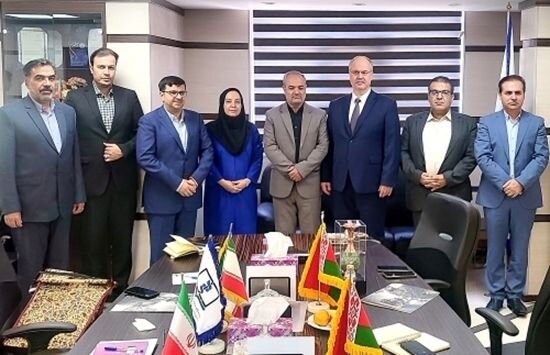Belarus envoy, SMUMS president explore avenues of cooperation

TEHRAN –The president of the Smart University of Medical Sciences (SMUMS) and the ambassador of Belarus in Tehran have discussed potential ways to enhance bilateral educational and scientific relations.
“The meeting primarily aims to explore opportunities for expanding collaboration with Iranian universities, particularly Smart University of Medical Sciences,” the health ministry website quoted the Belarusian envoy, Dmitry Koltsov, as saying.
He also highlighted the significance of boosting cooperation in medical and technological sectors and suggested signing a memorandum of understanding.
Referring to the successful experiences of Belarus in advancing physician expertise and developing educational systems, the official expressed his country's willingness to share experiences and conduct joint educational courses with Iran.
The SMUMS president, Hassan Bakhtiari, for his part, stated that the cooperation can provide an opportunity for joint progress in medicine and modern technologies.
He went on to suggest potential areas of collaboration like holding scientific courses for Belarusian professors, and educational courses for students, as well as participating in international congresses of artificial intelligence.
The official also expressed optimism that singing a MoU would serve as a roadmap for developing scientific and educational ties between the two countries.
During the meeting, Ahmad Ahmadi, vice chancellor for international affairs, highlighted the university's prominent role in advancing cutting-edge technologies, including artificial intelligence, and its impact on improving educational and research processes.
"With the expansion of artificial intelligence across all fields, especially in health and medical sciences, the university has received a special mandate from the Ministry of Health to promote AI in health issues and medical education,” he added.
Babak Sabet, vice chancellor of academic affairs of the university, suggested the possibility of conducting virtual doctoral programs in artificial intelligence and e-learning, as well as granting joint degrees.
Furthermore, he referred to the potential collaboration with Belarusian professors on the editorial board of the Journal of Visualized Medicine.
Smart University of Medical Sciences (SMUMS) is the first and only specialized university in e-learning and new technologies in the field of Medical Science in Iran.
SMUMS was established in 2016 in alliance with the Ministry of Health and Medical Education policies. Since its founding, the university has contributed to the growth of the virtual education approach in the country, by developing software, introducing new teaching strategies, and developing guidelines and regulations on virtual education.
SMUMS collaborates with several national and international health organizations to create, produce, and deliver virtual and blended programs to audiences around the world.
The creation of a national Learning Management System (LMS) known as the NAVID platform is a major accomplishment of the Smart University of Medical Sciences and is being used by almost 70 medical universities nationwide.
Another major project that was successfully designed and implemented by SMUMS is the first standard national Massive Online Open Course (MOOCs) platform, ARMAN, to provide nationwide equal educational opportunities. This platform has a wide range of interactive courses to choose from.
The Smart University of Medical Sciences has provided a virtual master's degree in "Medical Education," exclusively for faculty members of medical universities. To date, over 1500 professors have participated in this program. A virtual residency program of “Family Medicine” has been created in the SMUS in collaboration with the Ministry of Health, and Medical Education. And since 2020 the SMUMS has launched a Ph.D. program for “e-learning in Medical Education.
Due to medical advancement and significant modifications to the health care delivery system, education, and research are almost impossible without the use of artificial intelligence, the Internet, and computer connections.
The introduction of new information technologies into educational, research, healthcare, and treatment facilities has altered how learning generally is done and how health treatments are delivered. Users are now exposed to a wide range of fresh information.
MT/MG
